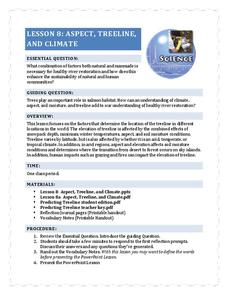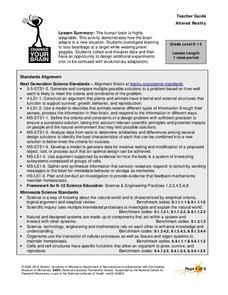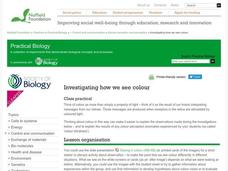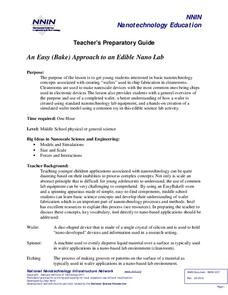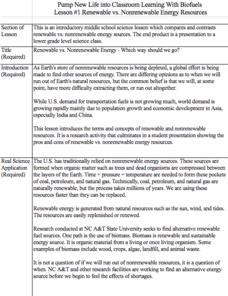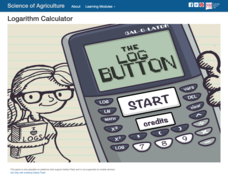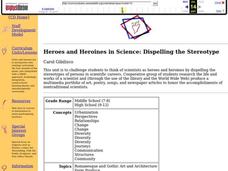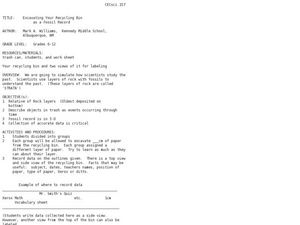LABScI
Population Dynamics: The Predator-Prey Lab
Wolves eat better when the bunny population increases, but how long does that last? A series of 12 biology lessons uses the sixth installment to explore the predator-prey relationship between bunny and wolf populations. Young scientists...
National Park Service
Aspect, Treeline, and Climate
Head to the treeline and beyond to examine how this feature of the landscape affects weather and climate, which gives scientists clues about its health. Class members' observations of photographs provide the data that drives the...
University of Minnesota
Altered Reality
Fascinate young life scientists by showing them how their brain learns. By using prism goggles while attempting to toss bean bags at a target, lab partners change their outlook on the world around them, producing amusing results....
American Chemical Society
The Energy of Evaporation
Do all liquids evaporate at the same rate? Young scientists observe the evaporation rate of three different liquids. They measure the time, the temperature, and the change in energy. After comparing the chemical formulas, scholars...
Consortium for Ocean Leadership
Nannofossils Reveal Seafloor Spreading Truth
Spread the word about seafloor spreading! Junior geologists prove Albert Wegener right in an activity that combines data analysis and deep ocean exploration. Learners analyze and graph fossil sample data taken from sites along the...
Polar Trec
Do Microorganisms Live in Antarctica?
Can microorganisms live in the dry, cold climate of Antarctica? Young scientists view a research project measuring microorganisms in the Taylor Glacier. They record the findings from dirty ice, clean ice, boots, sediment, and more. Then...
NOAA
To Explore Strange New Worlds
It's time to boldly go where your class has not gone before! The introductory lesson in a five-part series takes young oceanographers aboard the NOAA Ship Okeanos to begin a study of ocean exploration. The lesson includes a comparison of...
Science 4 Inquiry
Monster Mash-Up of Genetics
It's alive! Young mad scientists create monsters as they explore the probabilities of genetic traits during a well-structured inquiry lesson. Pairs travel from station to station, rolling the dice and adding traits to their creations as...
Nuffield Foundation
Investigating How We See Colour
Can you eyes be fooled into seeing colors that aren't actually there? Budding scientists view a presentation that addresses this topic. They explore how their eyes interpret color through the retinas and messages sent to the brain. They...
National Nanotechnology Infrastructure Network
An Easy (Bake) Approach to an Edible NanoLab
You can make it if you bake it! Young scientists model electronic chip fabrication with an easy bake oven. They create a design to embed in their brownie "chips" and compare their models to wafer production in basic nanotechnology.
Kenan Fellows
Renewable vs. Nonrenewable Energy Resources
Is one type of energy inherently good or bad? Young scientists explore energy resources in a week-long unit. After extensive research, groups create powerful position statements and presentations supporting their energy resource of choice.
Microsoft
Conditionals
The conditions are ripe to learn about conditionals. Young computer scientists consider conditionals in their daily lives, then apply their knowledge to computer coding. The fifth of nine parts in the Intro to CS with MakeCode uses...
California Academy of Science
Your Hidden Water Footprint: Defining a Problem to Find a Solution
One 17-ounce bottle of Cola requires around 46 gallons of water to produce. How is that possible? Young scientists learn about the hidden water used to produce everyday items. They research, discuss, and look for ways to reduce water...
College Board
Strategies for Teaching AP Computer Science
Implement strategies from the beginning to the end. A collection of strategies and lessons span from the first day of school to after the exam. Resources cover basic information such as computer ethics and top 10 tips to a lesson on how...
Learning Games Lab
Nitrogen in Pollutants
Responsible farming is important for maintaining natural resources. Eager scientists complete a WebQuest to explore what happens to nitrogen when it enters the soil. They learn about the chemical makeup of nitrogen-based molecules and...
Learning Games Lab
Scientific Graph Reading
Interpreting graphs is an essential skill for young scientists. An interactive online lesson gives individuals an opportunity to review the components of a graph and learn to read and interpret the shape of a graph. The lesson includes...
Learning Games Lab
Logarithm Calculator
Support your young scientists' knowledge of logarithms with a quick video lesson. The instruction first presents the relationship between a base-10 logarithm and an exponential equation. It then demonstrates how to use a calculator to...
American Museum of Natural History
Trip Up Your Brain
Sometimes different parts of the brain disagree. See what this disagreement looks like using a remote learning resource to experience how brains often take shortcuts. Pupils complete the activity, observe their results, and then read...
American Chemical Society
Liquids - Clearly Unique
Bring chemistry to life for scholars as they perform two tests to examine the unique properties of three liquids. Classroom investigators make observations, develop basic lab skills, and follow step-by-step instructions to compare water,...
Exploratorium
A Splash of Color - Is Pure Water Colorless?
What makes the ocean blue but a glass of ocean water nearly colorless? Investigators prepare tubes of water to examine the color of water. Scholars discover the relationship between light absorption, color variations, and water depth as...
PBS
Water Cycle and Watersheds: Ways of Watersheds | UNC-TV Science
Take a field trip with water as it moves on and below Earth's surface. Investigators discover the link between water and land in the water cycle and the importance of watersheds while viewing an animated video. Scholars test their...
Curated OER
Careers in Mining
Students study about natural resources and the decreasing amount. They observe the need for trained scientists and engineers. Finally, they take a small test to determine the areas of science they find most interesting.
Curated OER
Heroes and Heroines in Science: Dispelling the Stereotype
Young scholars describe and illustrate a stereotypical scientist. They work in cooperative groups to research and produce a portfolio of work honoring a randomly chosen nontraditional scientist. Students create a presentation about...
Curated OER
Excavating Your Recycling Bin as a Fossil Record
Students explore how scientists examine the past and use rock layers with fossils to understand the past. For this excavation lesson students divide into groups and complete an activity.



